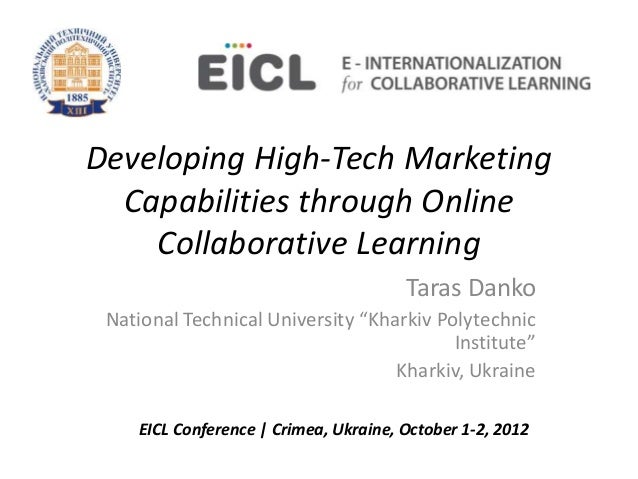
Danko Taras (2012) Developing high tech marketing capabilities through online collaborative learning
- 1. Developing High-Tech Marketing Capabilities through Online Collaborative Learning Taras Danko National Technical University “Kharkiv Polytechnic Institute” Kharkiv, Ukraine EICL Conference | Crimea, Ukraine, October 1-2, 2012
- 2. Content • Introduction • Theory Framework – Marketing Capabilities – Continuous improvement of marketing capabilities – Emergence of online collaborative workspaces • Research Problem • Findings: Creation of Collaborative E- community for Developing High-tech Marketing Capabilities
- 3. Objective • Applying online collaborative learning at workplace in case of high-tech B2B marketing Explanatory note: Developing marketing capabilities of high-tech SMEs is a good area for applying and testing online collaborative learning approaches and methods.
- 4. Theoretical background • Marketing Capabilities can be viewed as a combination of knowledge, skills, processes, tools, and organizational practices that are necessary for satisfactory performing corresponding marketing operations according to outlined strategy. • Improvement of marketing capabilities is achieved through the collaborative learning effort at the workplace. • Businesses are deploying social networks internally to encourage the sharing of best practice and facilitate cross-department and overall employee collaboration
- 5. Research Problem The process of creating effective collaborative learning communities in an online environment is vulnerable to many circumstances and factors that need further study (Brindley, Walti, & Blaschke, 2009). In particular, this is a problem for high-tech SMEs who lack internal capacity for developing their marketing capabilities through creating corporate learning communities.
- 6. Method • As the framework for describing the process of creation of online collaborative community the collaboration management cycle model is applied (Soller, Martínez Monés, Jermann, & Muehlenbrock, 2005). • The target audience of the experiment includes high-tech SMEs and marketing professional services providers who should be accessed through open social networks. • It is widely recognized that an appropriate learning approach for identifying and enhancing valuable marketing capabilities in VUCA circumstances is case-based reasoning (Aamodt & Plaza, 1994; Zaharias, Samiotis, & Poulymenakou, 2001). • The online workspace for the study purposes was established as a Facebook page of collaborative community for sharing cases in high-tech B2B marketing best practices (https://www.facebook.com/G2GMCC).
- 7. The Screenshot of Cover and Avatar of the Created Page https://www.facebook.com/G2GMCC
- 8. G2GMCC: Distribution of Cases According to High-tech B2B Marketing Capabilities Model (28-Sep-12) Process Area Marketing capabilities # of cases Intelligence Foresight; Scenarios; Trend watch; Client collaboration; Marketing research; Client business analysis; Market canvas; Competitive benchmarking 3 Planning Business model; Strategy; Brand; Product; Value proposition & pricing; Customer service; Touch points 12 Creative Production Design; Video; Photo; Print; Content; Web solutions; Blogging; Gifts, souvenirs, promotional items 13 Marketing Campaign Tradeshows; Web/SEO/Social media; Conferences/RTs; Events, roadshow, experiential marketing; Gamification; Traditional media; PR; Sales promotion; Leads nurturing; Sales & CRM; Partnering with complementary businesses; Customer T&D; SRM; Post-sales engagement 18 Supply Chain Management Agile chains; Channel programs (incl. market development initiatives) 1 Marketing Management Market orientation; Revenue model; Marketing KPI; Business processes; Organizing; Coordination of R&D, marketing and production; SCRUM; Learning; HRM; MAS 13
- 9. The collaboration management cycle Phase 1: Collect interaction data Phase 2: Construct a model of interaction Phase 3: Compare the current state of interaction to the desired state Phase 4: Advise/ guide the interaction
- 10. Geography of page fans • Ukraine – 27 fans • USA – 4 • United Kingdom – 3 • Germany – 2 • Romania – 1 • Israel – 1 • Slovakia – 1 • Italy – 1 • Russia – 1 • Slovenia – 1
- 11. DEMOGRAPHICS OF G2GMCC PAGE FANS Age group Female Male 13 – 17 0% 0%% 18 – 24 11,9% 7,1% 25 – 34 16,7% 14,3% 35 – 44 7,1% 19% 45 – 54 4,8% 7,1% 55 – 64 0 2,4% 65+ 2,4% 2,4%
- 12. COMPARISON OF THE CURRENT STATE OF INTERACTION TO THE DESIRED STATE Variable Current State Desired State TAT 10 >100 Multinationality, % of fans from the same country 64% (Ukraine) 20%< Percentage of interactions generated by primary audience, % 15% >60% Best virality, % 6% >10% Capability enhancement interactions per month 3 >30 Total interactions per 28 days 42 300
- 13. The final phase recommendations • focus on communicating to the primary audiences of the advantages of case-based learning for high-tech b2b marketing capabilities development; • provide more practical examples of marketing capabilities development; • annotate the case properly: describe the situation in the question form, solution, emphasize the key points of difference; • abide common Facebook moderation and audience building tips; • suggest incentives for the organizations where primary audience work; • adopt agility in collaborative lifecycle management by monitoring the results of the remedial actions and acting on them.
- 14. Conclusions • The process of creating effective collaborative online community does not have enough theoretical background. • Moreover, the suggested application of case- based learning method for online collaboration in marketing capabilities development needs further elaboration. • Further research will be focused on finding the major drivers for achieving effective marketing capabilities development through online social collaboration.
